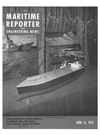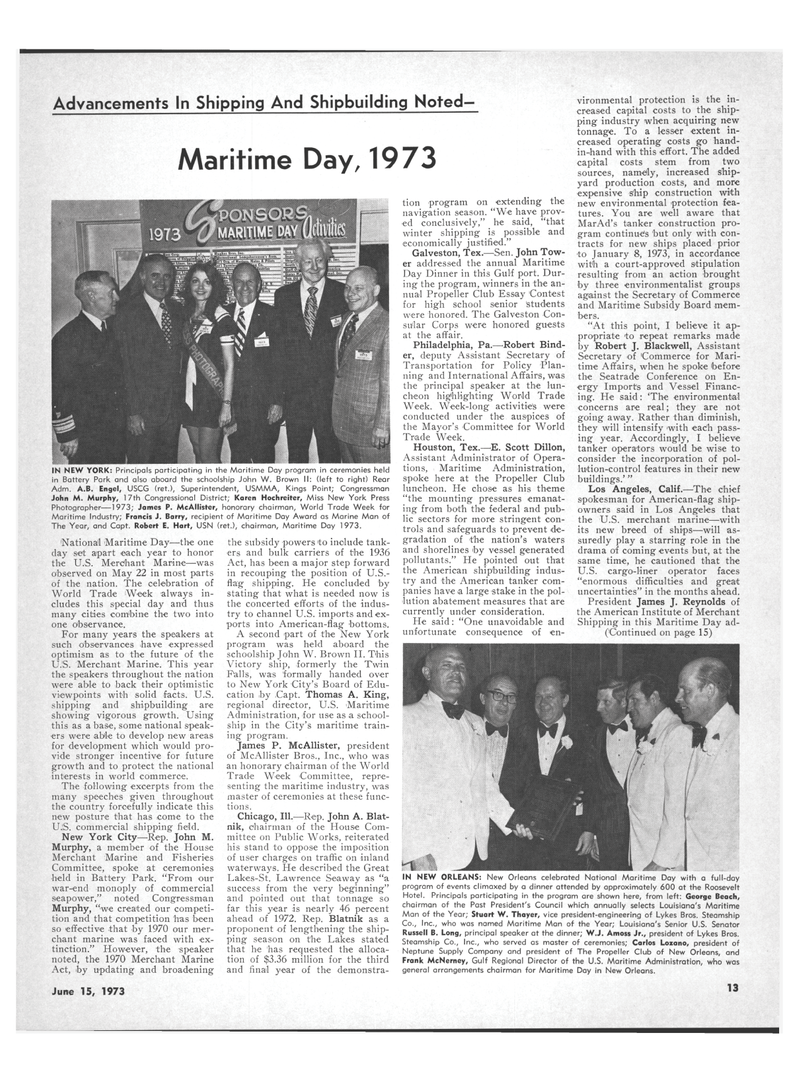
Page 11: of Maritime Reporter Magazine (June 15, 1973)
Read this page in Pdf, Flash or Html5 edition of June 15, 1973 Maritime Reporter Magazine
Advancements In Shipping And Shipbuilding Noted-
Maritime Day, 1973
IN NEW YORK: Principals participating in the Maritime Day program in ceremonies held in Battery Park and also aboard the schoolship John W. Brown II: (left to right) Rear
Adm. A.B. Engel, USCG (ret.), Superintendent, USMMA, Kings Point; Congressman
John M. Murphy, 17th Congressional District; Karen Hochreiter, Miss New York Press
Photographer—1973; James P. McAllister, honorary chairman, World Trade Week for
Maritime Industry; Francis J. Barry, recipient of Maritime Day Award as Marine Man of
The Year, and Capt. Robert E. Hart, USN (ret.), chairman, Maritime Day 1973. 'National Maritime Day—the one day set apart each year to honor the U.S. Merchant Marine—was observed on May 22 in most parts of the nation. The celebration of
World Trade Week always in- cludes this special day and thus many cities combine the two into one observance.
For many years the speakers at such observances have expressed optimism as to the future of the
U.S. Merchant Marine. This year the speakers throughout the nation were able to back their optimistic viewpoints with solid facts. U.S. shipping and shipbuilding are showing vigorous growth. Using this as a base, some national speak- ers were able to develop new areas for development which would pro- vide stronger incentive for future growth and to protect the national interests in world commerce.
The following excerpts from the many speeches given throughout the country forcefully indicate this new posture that has come to the
U.S. commercial shipping field.
New York City—Rep. John M.
Murphy, a member of the House
Merchant Marine and Fisheries
Committee, spoke at ceremonies held in Battery Park. "From our war-end monoply of commercial seapower," noted Congressman
Murphy, "we created our competi- tion and that competition has been so effective that by 1970 our mer- chant marine was faced with ex- tinction." However, the speaker noted, the 1970 Merchant Marine
Act, hy updating and broadening the subsidy powers to include tank- ers and bulk carriers of the 1936
Act, has been a major step forward in recouping the position of U.S.- fla'g shipping. He concluded by stating that what is needed now is the concerted efforts of the indus- try to channel U.S. imports and ex- ports into American-flag bottoms.
A second part of the New York program was held aboard the schoolship John W. Brown II. This
Victory ship, formerly the Twin
Falls, was 'formally handed over to New York City's Board of Edu- cation by Capt. Thomas A. King, regional director, U.S. Maritime
Administration, for use as a school- ship in the City's maritime train- ing program.
James P. McAllister, president of McAllister Bros., Inc., who was an honorary chairman of the World
Trade Week Committee, repre- senting the maritime industry, was master of ceremonies at these func- tions.
Chicago, 111.—Rep. John A. Blat- nik, chairman of the House Com- mittee on Public Works, reiterated his stand to oppose the imposition of user charges on traffic on inland waterways. He described the Great
Lakes-St. Lawrence Seaway as "a success from the very beginning" and pointed out that tonnage so far this year is nearly 46 percent ahead of 1972. Rep. Blatnik as a proponent of lengthening the ship- ping season on the Lakes stated that he has requested the alloca- tion of $3.36 million for the third and final year of the demonstra- tion program on extending the navigation season. "We have prov- ed conclusively," he said, "that winter shipping is possible and economically justified."
Galveston, Tex.—Sen. John Tow- er addressed the annual Maritime
Day Dinner in this Gulf port. Dur- ing the program, winners in the an- nual Propeller Club Essay 'Contest for high school senior Students were honored. The Galveston Con- sular Corps were honored guests at the affair.
Philadelphia, Pa.—Robert Bind- er, deputy Assistant Secretary of
Transportation for Policy Plan- ning and International Affairs, was the principal speaker at the lun- cheon highlighting World Trade
Week. Week-long activities were conducted under the auspices of the Mayor's Committee for World
Trade Week.
Houston, Tex.—E. Scott Dillon,
Assistant Administrator of Opera- tions, Maritime Administration, spoke here at the Propeller Club luncheon. He chose as his theme "the mounting pressures emanat- ing from both the federal and pub- lic sectors for more stringent con- trols and safeguards to prevent de- gradation of the nation's waters and shorelines 'by vessel generated pollutants." He pointed out that the American shipbuilding indus- try and the American tanker com- panies have a large stake in the pol- lution abatement measures that are currently under consideration.
He said: "One unavoidable and unfortunate consequence of en- vironmental protection is the in- creased capital costs to the ship- ping industry when acquiring new tonnage. To a lesser extent in- creased operating costs go hand- in-hand with this effort. The added capital costs stem from two sources, namely, increased ship- yard production costs, and more expensive ship construction with new environmental protection fea- tures. You are well aware that
MarAd's tanker construction pro- gram continues but only with con- tracts for new ships placed prior to January 8, 1973, in accordance with a court-approved stipulation resulting from an action brought by three environmentalist groups against the Secretary of Commerce and Maritime Subsidy Board mem- bers. "At this point, I believe it ap- propriate 'to repeat remarks made by Robert J. Blackwell, Assistant
Secretary of 'Commerce for Mari- time Affairs, when he spoke before the Seatrade Conference on En- ergy Imports and Vessel Financ- ing. He said: 'The environmental concerns are real; they are not going away. Rather than diminish, they will intensify with each pass- ing year. Accordingly, I believe tanker operators would be wise to consider the incorporation of pol- lution-control features in their new buildings.' "
Los Angeles, Calif.—The chief spokesman for American-flag ship- owners said in Los Angeles that the U.S. merchant marine—with its new breed of ships—will as- suredly play a starring role in the drama of coming events but, at the same time, he cautioned that the
U.S. cargo-liner operator faces "enormous difficulties and great uncertainties" in the months ahead.
President James J. Reynolds of the American Institute of Merchant
Shipping in this Maritime Day ad- (Continued on page 15)
IN NEW ORLEANS: New Orleans celebrated National Maritime Day with a full-day program of events climaxed by a dinner attended by approximately 600 at the Roosevelt
Hotel. Principals participating in the program are shown here, from left: George Beach, chairman of the Past President's Council which annually selects Louisiana's Maritime
Man of the Year; Stuart W. Thayer, vice president-engineering of Lykes Bros. Steamship
Co., Inc., who was named Maritime Man of the Year; Louisiana's Senior U.S. Senator
Russell B. Long, principal speaker at the dinner; W.J. Amoss Jr., president of Lykes Bros.
Steamship Co., Inc., who served as master of ceremonies; Carlos Lozano, president of
Neptune Supply Company and president of The Propeller Club of New Orleans, and
Frank McNerney, Gulf Regional Director of the U.S. Maritime Administration, who was general arrangements chairman for Maritime Day in New Orleans.
June 15, 1973 13

 10
10

 12
12
